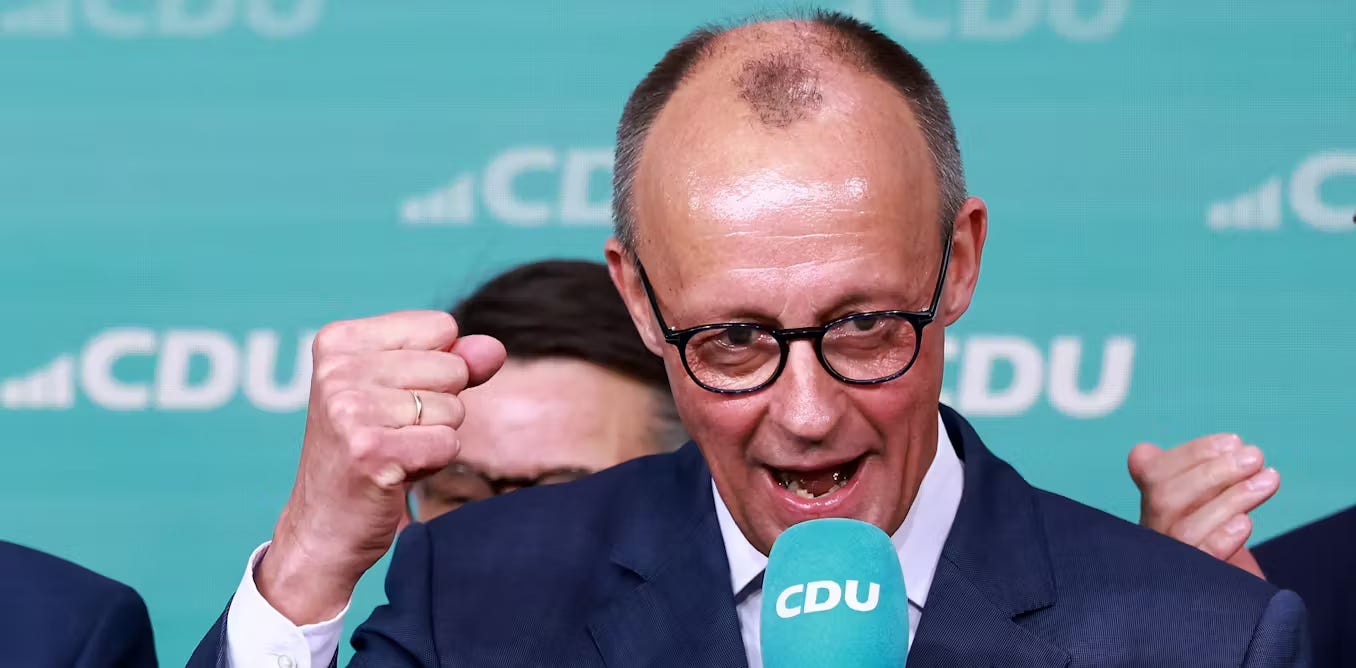BlackRock's CDU Komissar hides what you don't see: the corporate state
Wants independent Europe, yet locked into British competition with Russia
Politicians take train to Ukraine to celebrate third anniversary of war
Related:
Germany Votes For The World - A Canadian eye on Europe's entrapment (Feb 22, 2025)
Germany May Vote In Vain For Change - Election polls suggest more of the same (Feb 21, 2025)
(2,000 words or 10 moments of your company.)
Feb 24, 2025
A strong performance from the populists in Germany's election with a predictable narrative from the legacy press:
"The exit poll said Mr Merz’s CDU had won 29 per cent of the vote, while Alternative for Germany secured 19.5 per cent, making a far-Right party the main opposition for the first time since the Nazis," writes Britain's Telegraph.
What this means is that the self-described centrists, with their extreme policies of de-growth, militarisation, and social capitulation, present themselves as the defenders of democracy against the bogeyman of the far right.
No attempt to define populist, of course: the popular will.
Missing context
The falling, but still large, number of voters are likely get their information from the mainstream media.
Here is Associated Press, one of the big-three news agencies along with Reuters and Agence France-Presse, explaining why Germany's economy is in the dumps:
Russia cut off gas. No mention at all of the Nord Stream pipeline or who blew it up;
China has gone from a customer to a competitor - an oversimplification of trade in terms of zero-sum gain;
Lack of investment - true of Western countries as a whole;
Lack of skilled workers, obstructions to high-skill immigration - falling wages are partly to blame and most migrants are unskilled;
Bureaucracy and time-consuming regulations - the only part of the article that is unquestionably true.
As we wrote in the previous article, Germany's elections are taking place on a broader stage than usual, shaped by external politics and having a global impact.
The major topics — jobs, energy costs and living standards, and the so-called centrists' enthusiasm for war — are common to elections elsewhere.
See: Germany Votes For The World - A Canadian eye on Europe's entrapment (Feb 22, 2025)
If voters are denied an honest account of the problems, their votes are not going to address the causes of Germany's malaise.
Reading Moneycircus would be a start.
As well as disguising the nature of the issues facing Germany, the political system creates straw men and manipulates events to shape politics.
Perhaps we should not be surprised at an upsurge in "stabbings by migrants" and car rammings in the closing days of Germany's election campaign.
While Alternative for Deutschland doubled its share of the vote, these outrages allowed the state media and corporate-owned press to blame xenophobia.
This is the same narrative that Britain's Labour government used to arrest its opponents after the Southport stabbings of three young girls in July 2024.
Is it an exaggeration to suggest the powers that be create their own opposition, as Lenin advised?
Not just the "migrant question" but the narrative of the beer hall populists in Munich and the Mongol hordes invading Ukraine from the east.
Playing on history allows the uniparty, however reckless its economic and military adventures, to claim to be the centre.
Maybe this is simplistic, perhaps it's a cynical view but consider the new chancellor.
Friedrich Merz represents the first time a former executive of the asset manager BlackRock has become head of government — although it dominates U.S. administrations. This is a bigger deal than Klaus Schwab's boast at the World Economic Forum to have "penetrated the cabinets."
Merz represented the interest of the plutocracy that is profiting from the deindustrialisation of Germany and the relocation of some of its biggest companies to America and China.
Simplistic or cynical, we continue to ask:
Who benefits from shutting down Germany's nuclear power plants - AFTER its gas supply via pipelines from Russia had been detonated under the Baltic Sea;
Why close the plants of VW and BASF, and hundreds of lesser known manufacturers;
And then import millions of migrants for jobs that no longer exist?
A BlackRock insider, sitting at the top table of the globalists, surely knows the answer, but it was not uttered during the election campaign.
His CDU voted with the AfD to tighten some regulations on migration, but that may be dismissed as an attempt to lure some of its voters.
Merz is a champion of public-private partnership in which corporations take over many of the roles of government. It is sold in terms of efficiency.
The fusion of our physical, digital, and biological identities is sold in similar words of convenience.
This masks the transformation of society by digital ID, and the centralised allocation of resources, including human.
Merz supports privatising and deregulating welfare systems, along with pensions, opposes a minimum age, supports maximum corporate freedom.
As Thomas Fazi reminds us, Merz is aligned with U.S. interests. He opposed the Nord Stream 2 pipeline, before it was blown up, even though lack of energy is the main reason for the contraction of Germany's economy. [1]
All change
Keep reading with a 7-day free trial
Subscribe to Moneycircus to keep reading this post and get 7 days of free access to the full post archives.



